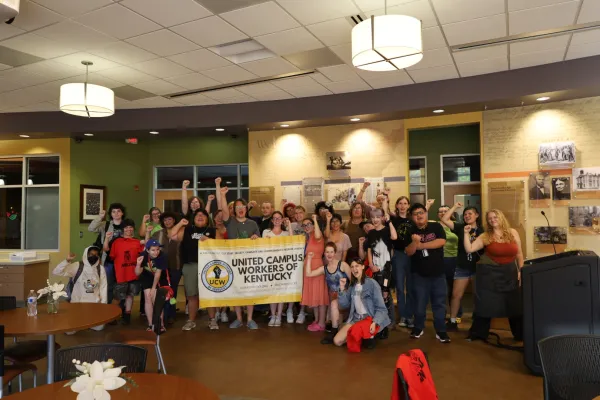‘I don’t want to feel unsafe at work.’ UK union presses for COVID-related benefits
This article was originally published in the Lexington Herald-Leader November 12, 2020 06:54 PM, Updated November 12, 2020 07:32 PM
Close to 50 students, faculty and staff marched the concrete pathways of the University of Kentucky campus Thursday to protest for COVID-19-related hazard pay, greater teleworking flexibility and a meeting with UK President Eli Capilouto.
The march culminated in the masked crowd rhythmically chanting Capilouto’s name outside the university’s main administrative building, demanding the president come down and accept a petition signed by just over 1,000 concerned students, workers and local community members. Capilouto never appeared. Tom Harris, the vice president for university relations, accepted the thick stack of the printed pages of the online petition and promised to get it to Capilouto.
The crowd was an eclectic mix of graduate student workers, groundskeepers, custodians, hospital workers, faculty, other staff and supporting students. UK’s United Campus Workers put on the protest and were joined by some student groups. Many of those present felt the university could do more to protect in-person workers during the pandemic, such as by offering daily temperature checks, or by providing monetary support to those who can’t telework through hazard pay.
UK spokesperson Jay Blanton, pushed against the group’s assertions, stating that the university had raised the minimum wage twice in the past two years — most recently to $12.50 — and had been ranked in a national survey as a “Great College to Work for” because of favorable employee responses on compensation, facilities, security and respect.
“UK has conducted more testing, tracing and screening than virtually any institution in the state,” Blanton said. “The institution has invested more than $30 million thus far this semester as part of our efforts to keep our campus healthy, safe and well.”
Those in the crowd still felt the university could do more to back its employees especially as COVID-19 cases have begun to spike again both locally and nationally. Keegan Stewart, a nurse at UK HealthCare, said employees like her are showing up and are facing the pandemic on the frontline.
“It’s going to be a long, cold, dark winter,” Stewart told the crowd through a megaphone. “But something that can make my life a little better — a little hazard pay. A little acknowledgment of some of the sacrifices that me and my family are making so that everyone else can have their families.”
Other campus workers said the pandemic has caused them to have to face other unforeseen challenges. Mary Sherman, a resident adviser — typically an older student who lives in and is in charge of portions of dormitory floors — said students in her job are among the most vulnerable on campus.
RAs have been asked to take on more this year, as they’re tasked with delivering food to students who are quarantining after COVID-19 exposures and are in charge of maintaining social distancing on their dorm floors. Many of those students couldn’t afford to live on campus if it weren’t for the job, Sherman said.
“I don’t want to feel unsafe at work,” Sherman said. “I don’t want to deliver food to quarantined residents who don’t obey the protocols.”
Sherman said the union demanded regular meetings with the president. She and other union members were also unhappy with the regular meetings that administration officials have had with the university’s housing partner, Greystar, a private company which helped pay to build and manage the university’s dorms.
In a report critical of the university’s relationship with Greystar, the union raised concerns over meetings the company’s employees had with administrators and the fact that Greystar has some on-campus representatives which have both Greystar and UK email addresses. The document is based on findings, the union came to through emails obtained via an open records request this fall. The union expects to deliver a fuller report
Blanton said Greystar has on-campus representatives who help in the management of the dorm buildings. He also said the dorms that the UK has built with Greystar since 2012 — which used to be called EdR — have been helpful during the pandemic because they’ve been able to provide more space to students than a traditional dorm.
Pierre Smith, a groundskeeper who has worked at the university for 15 years said he joined the union because “it was time for a change.” Smith said he was happy with Thursday’s protest and hopes that dialogue between the union and the administration can continue.
“All we need is someone that can listen to us,” Smith said. “We don’t bite.”
Berea College agrees to 'sick leave' policy for student workers

